5 reasons why College Football should heed Nick Saban’s warnings

Former Alabama football head coach Nick Saban has been and forever will be one of the most respected figures in college football history. Now, he’s letting his voice be heard regarding the state of the game he left a lasting impact on.
While serving as the Crimson Tide’s coach, Saban did not try to hide his emotions and thoughts on the constant changes to college football. Whether it be rule changes, the transfer portal, or name, image, likeness policies, he was one of the few whose opinion carried significant weight.
Now, as a retiree who is keeping close ties to the University of Alabama and college football overall, Saban wants to see some positive changes and plans on being a guiding force to make them happen.
In a recent interview with ESPN, Saban opened up about what’s ongoing in the sport and what alterations he would make to the status quo.
Here are five reasons why his warnings and requests should be taken seriously by the powers that be in the realm of college football.
He's now a neutral party
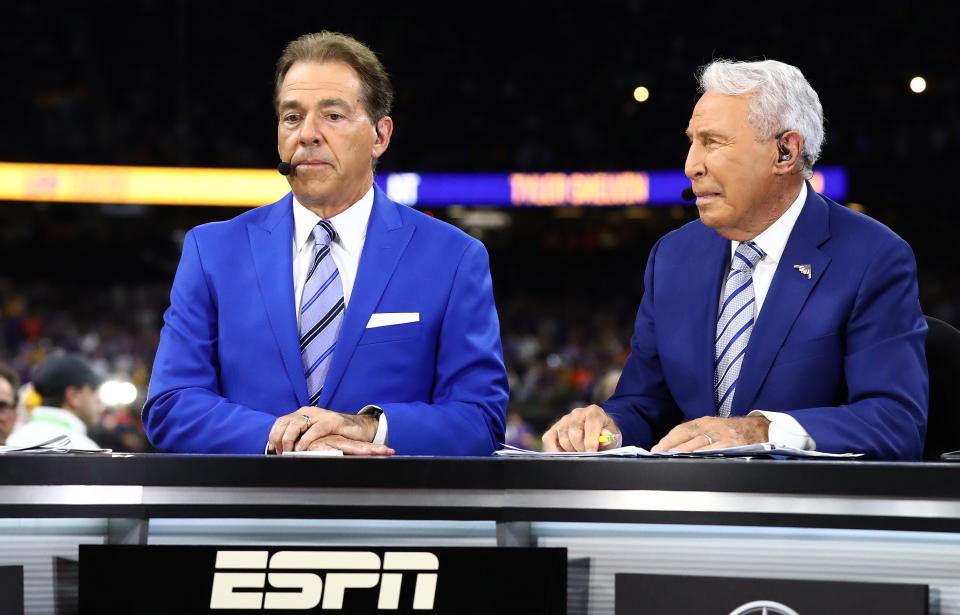
Before retiring, one of the biggest arguments against Saban was that he was sharing his thoughts from the perspective of a coach who only wants what’s best for his program.
While he will still be connected to Alabama, he is now looking to make a difference to the game as a whole, with his goal being to benefit all players, programs, and fans equally. Even new Crimson Tide head coach Kalen DeBoer chimed in on Saban’s neutrality as he pushes to improve college football.
“Nobody can say it’s about him or his team now,” DeBoer said. “He wants to see the game move in the right direction. We need that, and if he can help make that happen, he will leave another legacy that might not go above what he’s accomplished on the field but will be far-reaching for everybody in our sport.”
Saban’s desire to change the game comes from a love for college football, not an allegiance to a specific university.
Wants what's best for the players
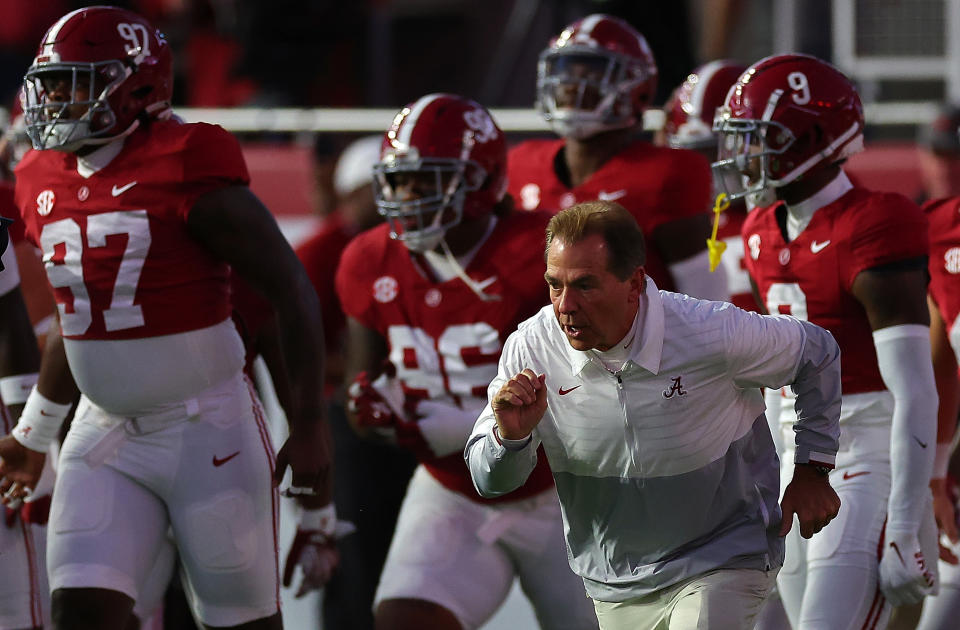
What’s the biggest aspect of college football that sets it apart from professional sports? The fact that the biggest stars on the field and the players deep on the depth chart are all tasked with attending classes like everyone else. They are student-athletes. However, amid mass debates, many have seemed to forget that.
“[W]e’ve gone to nobody talking about education, nobody talking about creating value for their future, to talking only about how much money can I make while I’m in college.
“I think the consequence of this could come down the road when some of these guys get 28 and 29 years old that maybe they didn’t prepare themselves for when they can’t play football anymore, which is what you should do when you go to college.”
This sentiment is not new to Alabama fans, as he has long preached about the importance of education and life skills off the football field. This endeavor to change the game for the better isn’t just to benefit all things related to football, it’s to make sure that everyone involved is set up to succeed.
He knows his role as an advocate
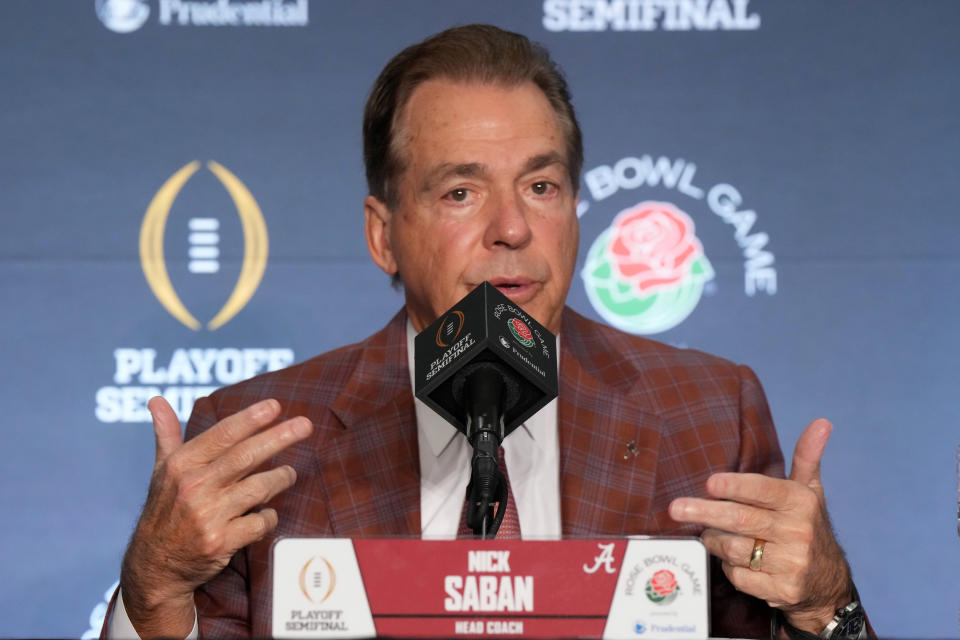
Though there have been plenty of jokes over the years about Saban becoming the commissioner of college football once he retires, it seems to be something he has no interest in.
“I’m not really looking for a job, but I do know I’d like to impact college football the best way I can, whether it’s being a spokesperson or anything else,” said Saban.
He stated that he wants to use his voice to bring about “meaningful change,” and said that there are others who are more qualified to take on a commissioner-like role from an administrative standpoint.
“They would be more qualified [to serve in a college football commissioner’s role] than I am. They’re in it every day and know all the issues,” Saban said. “That’s why I’m hesitant to come up with a firm solution because you don’t know the consequences of the solution relative to, ‘All right, do we have to pass antitrust laws to be able to do it this way? What does it all entail?’
“It’s one thing to come up with a solution. It’s another thing to implement it. I’m just here to help.”
This is important because it shows that Saban understands what he’s capable of and that he does not want to overstep any boundaries. He’s not interested in creating rules or acting as a college football legislator of sorts. His goal is to be an advocate for the sport and everybody in and around it.
He's not anti-NIL
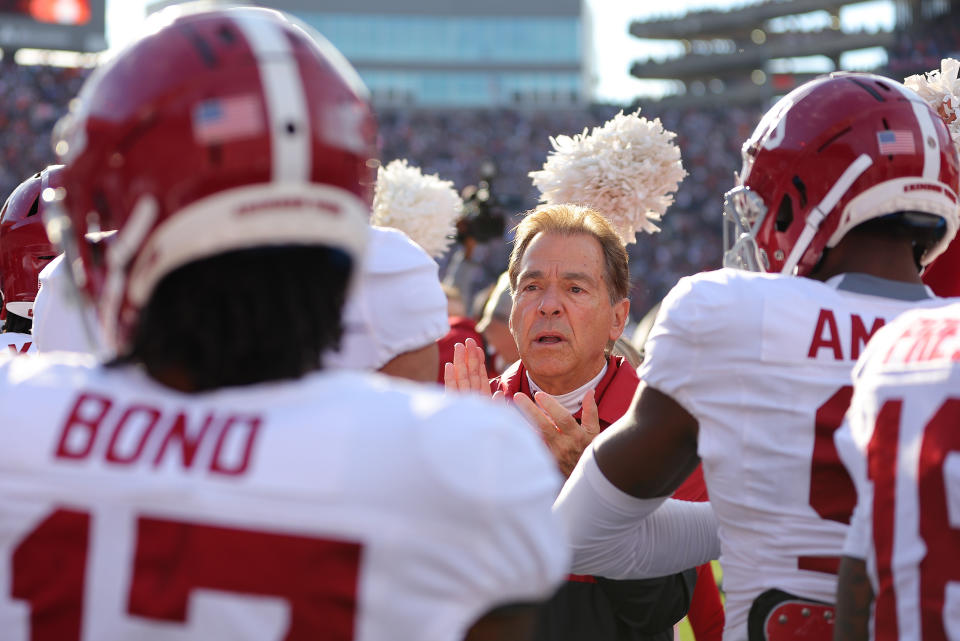
For a while, Saban has treaded lightly around the topic of name, image, likeness and what it would mean for college football. A couple of years into the NCAA allowing players to earn money and there are a slew of issues. The problem isn’t that players are generating money, albeit at drastically different levels, but that it is largely unregulated. There are many variables to name, image, likeness that are left to be dealt with and no one appears quite sure where to start.
The common belief has been that Saban is against name, image, likeness. Well, recent quotes show that he’s not opposed to it, he just wants there to be uniform guidelines across the board to avoid ambiguity and problems.
“People can give money to the university again and get a tax deduction for doing it, and the university in some kind of way shares, whether it’s share revenue, whether it’s buying marketing rights, which is a possibility,” Saban suggested. “You can buy somebody’s marketing rights as an institution, and I don’t want to say cap because that sounds like a salary cap, but find a way for schools to invest the same amount of money in players, just like everybody can invest the same amount in a scholarship. This becomes a part of the scholarship.”
The current method is largely done through collectives, which Saban isn’t too fond of. “[W]hat you have now isn’t name, image and likeness. A collective has nothing to do with name, image and likeness,” Saban said. What he’s made clear here is that he wants players to have the ability to earn money, but there must be a fair and regulated way of doing so.
Restoring the value of a commitment
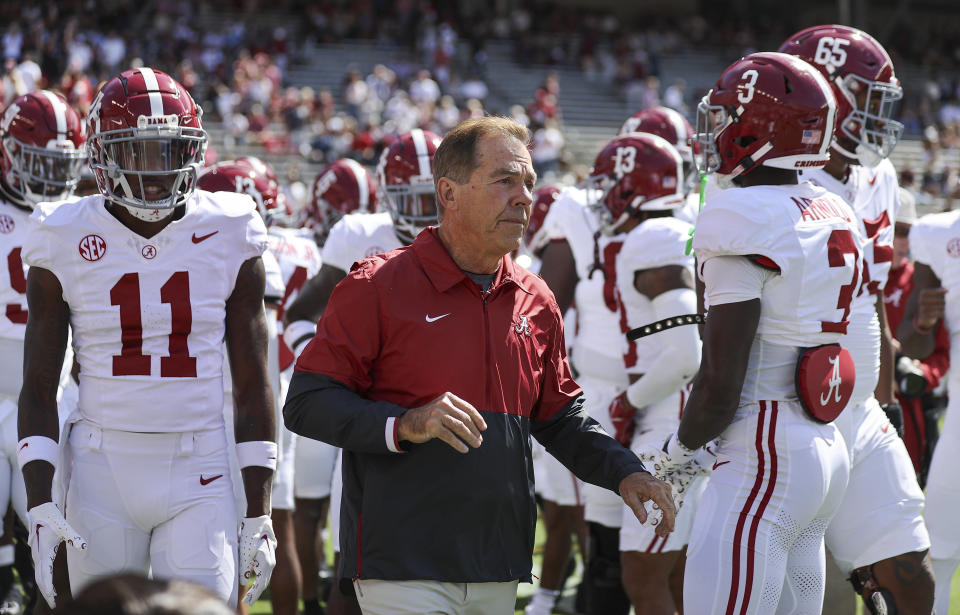
One of the most noticeable byproducts of the recent changes to college football is what some consider a lack of loyalty or honoring commitments. The widening of the transfer portal and the implementation of name, image, likeness have led to players and recruits moving around more often and abruptly. Some fans defend it as being the nature of the beast that is the new landscape of college football and compare it to coaches, who are often on the move in chase of stronger titles and larger contracts.
Saban, who was one of the most successful high school and transfer portal recruiters, raises questions as to how this impacts the fans.
“Just like an NFL player has a contract or a coach has a contract, something in place so you don’t have all this raiding of rosters and mass movement,” he said. “I wonder what fans are going to say when they don’t even know the team from year to year because there’s no development of teams, just bringing in new players every year.”
His argument isn’t to close the portal and cut off any financial opportunities to players, but that the way it’s all being done should be revised so that players are encouraged to honor commitments.
This point is by far the most contentious, as what fans desire may not be what’s in the best interest of the players. For example, if a player has an opportunity to transfer to a different program where he will receive more playing time and a quality name, image, likeness deal, why should he not take that up? Saban is not claiming to have the answer to this, but he does point to it as something that ought to be looked into, as it benefits some programs, but hurts many others.
Contact/Follow us @RollTideWire on X, and like our page on Facebook to follow ongoing coverage of Alabama news, notes and opinion. You can also follow AJ Spurr on X @SpurrFM.

